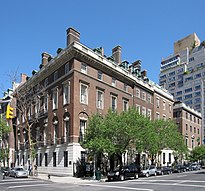Council of the Americas
This article has multiple issues. Please help improve it or discuss these issues on the talk page. (Learn how and when to remove these messages)
|
| File:Council of the Americas logo.png | |
| Formation | 1963 |
|---|---|
| Headquarters | 680 Park Avenue New York, NY 10021 United States |
| Location |
|
| Coordinates | 40°46′08″N 73°57′58″W / 40.768830°N 73.965975°W |
CEO | Susan L. Segal |
| Website | www |
Council of the Americas is an American business organization whose goal is promoting free trade, democracy and open markets throughout the Americas. This includes Canada, Mexico and the Caribbean, as well as South America. Its members share a common commitment to economic and social development, open markets, the rule of law, and democracy throughout the Western Hemisphere. The Council's membership consists of leading international companies representing a broad spectrum of sectors, including banking and finance, consulting services, consumer products, energy and mining, manufacturing, media, technology, and transportation.
History
The group was founded in 1963 as the Business Group for Latin America by David Rockefeller, at the request of President John F. Kennedy as a means for business to fight the influence of Fidel Castro in Latin America.[1] The Kennedy administration conceded investment guarantees, which by 1967 would cost the government $600 million in the case of Chile alone.[2] Almost 30 corporations participated by 1965, when the Business Group was reorganized as the Council for Latin America.[3] Since that time, membership has grown to over 200 blue chip companies that represent the majority to the U.S. private investment in Latin America.
Present


The Council hosts presidents, cabinet ministers, central bankers, government officials, and leading experts in economics, politics, business, and finance. This gives it access to information of the region.
The Council of the Americas argues that free markets and private enterprise offer the most effective means to achieve regional economic growth. It has been a supporter of free trade agreements and has been instrumental in the conception of the North American Free Trade Agreement (NAFTA) and the Central American Free Trade Agreement (CAFTA).
The Council has campaigned for Trade Promotion Authority[citation needed], usually referred to as "fast track", which gives the president of the US authority to negotiate trade agreements that cannot be amended by Congress, and are voted on as only 'yes' or 'no'. In effect from 1975 to 1994 – during which time it resulted in NAFTA – it was restored in 2002 by the US Trade Promotion Authority Act.
Mack McLarty, chief of staff for Bill Clinton, was a crucial liaison of the Council to the Clinton administration. He also served as Clinton's "special envoy to the Americas," in which capacity he was a key mover and shaker in the creation of NAFTA and the yet to be implemented Free Trade Area of the Americas (FTAA), which originated from David Rockefeller.[citation needed] McLarty was a top official at the 1994 Miami Summit of the Americas which laid the groundwork for this Trade bloc.
Further reading
- Memoirs, David Rockefeller, New York: Random House, 2002.
See also
- David Rockefeller
- Mack McLarty
- Kissinger McLarty Associates
- Latin America
- North American Free Trade Agreement (NAFTA)
- Free Trade Area of the Americas
- Americas Quarterly
- Rockefeller family
References
- ^ Hersh, Seymour M. (December 1, 1982). "The Price of Power: Kissinger, Nixon, and Chile". The Atlantic.
- ^ Prados, John (2006). Safe for Democracy: The Secret Wars of the CIA. Ivan R. Dee. p. 398. ISBN 9781615780112.
- ^ Griffith-Jones, Stephany (1979). "The Alliance for Progress: An Attempt at Interpretation" (PDF). Development and Change. 10: 429.
